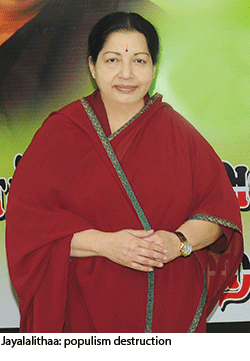 The sudden death in office on December 5 of Tamil Nadu’s charismatic chief minister J. Jayalalithaa, commonly referred to as amma (‘mother’), has left a huge political vacuum in the state’s politics and within the ruling All India Anna Dravida Munnetra Kazhagam (AIADMK) party which she led for three decades since 1991. Her several terms in office were marked by famous electoral victories, but also corruption scandals that stunned the nation.
The sudden death in office on December 5 of Tamil Nadu’s charismatic chief minister J. Jayalalithaa, commonly referred to as amma (‘mother’), has left a huge political vacuum in the state’s politics and within the ruling All India Anna Dravida Munnetra Kazhagam (AIADMK) party which she led for three decades since 1991. Her several terms in office were marked by famous electoral victories, but also corruption scandals that stunned the nation.
Moreover, the late chief minister’s populist policies also spilled over into education where they did more harm than good. Indeed even as there is growing awareness of the critical importance of education for national development, it’s becoming increasingly clear that reckless political interference in education by the state’s two major political parties — the Dravida Munnetra Kazhagam (DMK) and AIADMK — which have dominated state politics since 1987, has wrecked Tamil Nadu’s once excellent education system.
Although these two political parties rooted in the make-believe world of popular Tamil cinema began to dominate state politics in the late 1980s, unwarranted interference in school education began during the rule of the DMK led by former cinema script-writer M. Karunanidhi, which legislated the Uniform System of School Education (USSE) Act 2010. The Act abolished Tamil Nadu’s four school examination boards and decreed a common curriculum (samacheer kalvi) and common textbooks for classes I to X of all 53,000 government and 10,934 private unaided primary-secondaries compulsorily affiliated with the Tamil Nadu State Board of School Education (TNSBSE). The successor AIADMK government had to grudgingly implement it.
Earlier in 2006, the AIADMK had abolished common entrance examinations for all professional undergraduate courses by enacting the The Tamil Nadu Regulation of Admission in Professional Courses Act, 2006 to create a level playing field for rural students who lack resources to train in coaching centres to compete with their urban counterparts. After passage of the Act, students were admitted into the state’s engineering and medical colleges on the basis of their class XII exam marks.
The net result of 30 years of DMK and AIADMK’s populist interventions in education is that standards and learning outcomes have plunged, and utterly under-prepared students are flooding Tamil Nadu’s highly reputed engineering and medical colleges. According to data obtained by the Chennai edition of the Times of India under a Right to Information (RTI) Act, 2005 application to the controller of examination of Anna University, 50 percent of first year students admitted into the 523 private non-autonomous (23 top-ranked private engineering colleges have been granted full autonomy) engineering colleges (out of a total of 552) affiliated with the university, failed their first (November-December) and second (April-May) semester exams last year (2015-16). In 2014-15, in the first semester exams 38.45 percent failed, against 50 percent in 2013-14, and 46.55 percent in 2012-13 indicating a rising trend. The second semester results trend in the last five years is broadly similar.
Unsurprisingly, school-leavers from Tamil Nadu who right until the 1990s routinely topped national entrance exams for entry into the country’s premier medical, engineering and law colleges including the IITs and NITs, have been faring disastrously in recent years.
Right until the 1990s, because of its legacy of good governance, orderly administration and relatively well-educated workforce, Tamil Nadu attracted substantial domestic and foreign investment which has developed the state’s industrial base. Consequently, the state has developed into a major hub of the automobile and auto components, IT and IT-enabled services and textile industries. But by unwarrantedly interfering with the state’s public education system during the past three decades, the DMK and AIADMK have severely damaged, if not destroyed its human resource base.
And for this unfortunate denouement Jayalalithaa is also to be blamed — even if to a lesser extent than Karunanidhi.
Hemalatha Raghupathi (Chennai)























